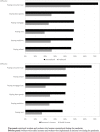Financial Distress and Psychological Well-Being During the COVID-19 Pandemic
- PMID: 36090842
- PMCID: PMC9453756
- DOI: 10.3389/ijph.2022.1604591
Financial Distress and Psychological Well-Being During the COVID-19 Pandemic
Abstract
Objective: We examine the impact of financial distress caused by the COVID-19 pandemic on mental health and psychological well-being. Methods: We analyze cross-sectional survey data (n = 2,545) from the Life during Pandemic study in Chile. We estimate linear probability models to analyze the relationship between economic fragility, financial distress, and psychological well-being. Results: Our findings show unemployment and income loss are highly predictive of experiencing a range of financial problems, such as a lack of savings, as well as difficulties paying bills, consumer debt, and mortgage loans. In turn, financial distress leads to a higher prevalence of poor well-being and mental health deterioration, and sleep problems. Conclusion: Expansion of mental health assistance services are needed, as new diagnosis of mental health conditions has increased, but treatment has not, pointing to a barrier in the access to some mental health care services during the pandemic. Policies designed with the objective of improving financial education are necessary to increase precautionary savings and financial resilience, and alleviate the psychological burden of debt in the future.
Keywords: COVID-19; financial distress; mental health; savings; well-being.
Copyright © 2022 Borrescio-Higa, Droller and Valenzuela.
Conflict of interest statement
The authors declare that the research was conducted in the absence of any commercial or financial relationships that could be construed as a potential conflict of interest.
Figures
Similar articles
-
Adult life-course trajectories of psychological distress and economic outcomes in midlife during the COVID-19 pandemic: evidence from the 1958 and 1970 British birth cohorts.Soc Psychiatry Psychiatr Epidemiol. 2023 May;58(5):779-794. doi: 10.1007/s00127-022-02377-w. Epub 2023 Jan 19. Soc Psychiatry Psychiatr Epidemiol. 2023. PMID: 36653540 Free PMC article.
-
A nationwide cross-sectional study of workers' mental health during the COVID-19 pandemic: Impact of changes in working conditions, financial hardships, psychological detachment from work and work-family interface.BMC Psychol. 2022 Mar 18;10(1):73. doi: 10.1186/s40359-022-00783-y. BMC Psychol. 2022. PMID: 35303966 Free PMC article.
-
The Impact of Work Loss on Mental and Physical Health During the COVID-19 Pandemic: Baseline Findings from a Prospective Cohort Study.J Occup Rehabil. 2021 Sep;31(3):455-462. doi: 10.1007/s10926-021-09958-7. Epub 2021 Mar 3. J Occup Rehabil. 2021. PMID: 33656699 Free PMC article.
-
Effect of gender and clinical-financial vulnerability on mental distress due to COVID-19.Arch Womens Ment Health. 2020 Dec;23(6):775-777. doi: 10.1007/s00737-020-01097-x. Epub 2021 Jan 9. Arch Womens Ment Health. 2020. PMID: 33420600 Free PMC article.
-
Tracing the bounds of distress: Mental health and the Lancet Commission on lessons for the future from the COVID-19 pandemic.J Glob Health. 2024 May 17;14:03022. doi: 10.7189/jogh.14.03022. J Glob Health. 2024. PMID: 38751302 Free PMC article. Review. No abstract available.
Cited by
-
Impact of pandemic-related worries on mental health in India from 2020 to 2022.Npj Ment Health Res. 2024 Nov 24;3(1):57. doi: 10.1038/s44184-024-00101-x. Npj Ment Health Res. 2024. PMID: 39582077 Free PMC article.
-
Financial hardship and psychological distress during and after COVID-19 lockdowns in Victoria, Australia: a secondary data analysis of four repeated state-wide surveys.BMJ Open. 2025 Mar 21;15(3):e093336. doi: 10.1136/bmjopen-2024-093336. BMJ Open. 2025. PMID: 40118488 Free PMC article.
-
Wilson Disease and the COVID-19 pandemic: exploring patients' mental health and vaccination attitudes in a longitudinal study.Front Psychol. 2024 May 13;15:1326802. doi: 10.3389/fpsyg.2024.1326802. eCollection 2024. Front Psychol. 2024. PMID: 38803830 Free PMC article.
-
The challenges of mental health in Chilean university students.Front Public Health. 2024 Mar 12;12:1297402. doi: 10.3389/fpubh.2024.1297402. eCollection 2024. Front Public Health. 2024. PMID: 38532969 Free PMC article.
-
Malnutrition, Depression, Poor Sleep Quality, and Difficulty Falling Asleep at Night Are Associated with a Higher Risk of Cognitive Frailty in Older Adults during the COVID-19 Restrictions.Nutrients. 2023 Jun 23;15(13):2849. doi: 10.3390/nu15132849. Nutrients. 2023. PMID: 37447178 Free PMC article.
References
-
- De La Flor L, Mujica I, Fontenez MB, Newhouse D, Rodriguez Alas C, Sabharwal G, et al. Taking Stock of COVID-19 Labor Policy Responses in Developing Countries. Jobs Watch COVID-19. Washington, DC: World Bank; (2021). Available from: https://openknowledge.worldbank.org/handle/10986/35331 .
-
- Zajacova A, Jehn A, Stackhouse M, Choi KH, Denice P, Haan M, et al. Mental Health and Economic Concerns from March to May during the COVID-19 Pandemic in Canada: Insights from an Analysis of Repeated Cross-Sectional Surveys. SSM Population Health (2020) 12(76me2):100704. 10.1016/j.ssmph.2020.100704 - DOI - PMC - PubMed
MeSH terms
LinkOut - more resources
Full Text Sources
Medical


